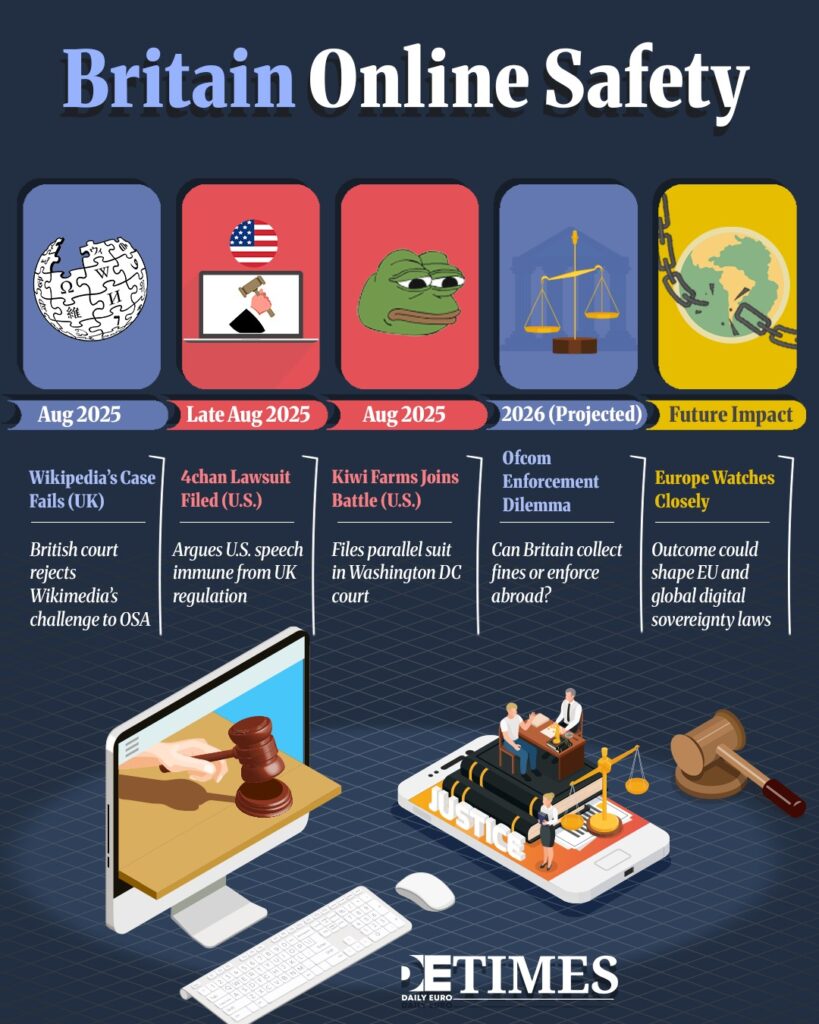A trio of lawsuits is taking aim at Britain’s Online Safety Act (OSA), setting up a legal showdown that asks a critical question: can a single national government really impose its will on the entire internet?
The Wikimedia Foundation (Wikipedia’s parent nonprofit) lost its case in a British court in August 2025. Just days later, American sites 4chan and Kiwi Farms filed their own suit an ocean away in Washington DC.
In the end, this might be less about legal principles and more about who has the deeper pockets.
When Wikipedia Went to Court
The nonprofit behind Wikipedia decided to take a stand against the OSA’s classification system rather than quietly fall in line. Unfortunately for them, Justice Johnson rejected all four arguments they presented.
It wasn’t a total loss, though. The court left the door open for a future challenge if the UK regulator, Ofcom, mistakenly labels Wikipedia as a high-risk “Category 1” service. So, whilst they lost this round, the larger war isn’t over.
American Platforms Take a Different Tack
Meanwhile, 4chan’s lawyers came up with a completely different–and brazen–strategy. Their lawsuit essentially claims that because Americans invented the internet, foreign governments have no right to regulate American speech on it.
Kiwi Farms joined this fight, making the same constitutional argument in a U.S. federal court instead of a British one. Both platforms are digging in their heels, refusing to pay any potential UK fines or set up age verification. They’re betting that an American court will side with them and block Britain from enforcing its rules.

It Might Come Down to Money, Not Morals
Behind all the legal drama lies a simple truth: this fight will likely be decided by economic power, not just who’s right. Wikipedia, as a nonprofit, has limited funds for a long, drawn-out global legal battle.
In contrast, the American commercial platforms have much deeper pockets and their home-court advantage. The OSA threatens massive fines, but those only work if Britain can actually collect them by seizing assets.
Tech companies learnt from previous regulations like GDPR that playing jurisdictional games can often let them sidestep the rules. For them, geography is a powerful trump card.
Ofcom’s Big Challenge
This puts UK regulators in a tough spot.
They can’t exactly arrest executives in Silicon Valley or freeze U.S. bank accounts. Ofcom has to hope for cooperation from platforms that are increasingly treating British rules as optional suggestions. The regulator’s own guidance is built on an assumption of compliance that might never happen.
Small agencies can easily get overwhelmed by the endless resources of big corporate legal teams. Britain’s gamble is testing whether any country can practically enforce its own internet laws on a global scale.
A Reality Check for Digital Sovereignty
The OSA was Britain’s bold post-Brexit move to prove it could govern the internet on its own terms, outside the EU. Other European powers are watching these cases closely, knowing the outcome could shape their own digital policies for years to come.
If Britain succeeds, it could inspire a wave of similar laws across Europe. If it fails, it might scare other governments away from even trying to regulate big tech.
The result will show us whether nations still have real authority over the global internet, or if corporate legal strategies have made true oversight a thing of the past. Right now, Britain is trying to win a high-stakes game where the tech giants seem to hold all the best cards.
Keep up with Daily Euro Times for more updates!
Read also:
Governments Buy Into Big Tech: The State as Silicon Valley Stakeholder
Palantir’s European Expansion: Tech Dependence Wrapped in Security
Big Tech Immoderation: Europe’s Digital Reckoning






